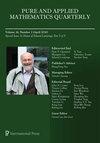场的协变指导定律
IF 0.8
4区 数学
Q3 MATHEMATICS
引用次数: 0
摘要
在回顾了从非相对论点粒子动力学的经典汉密尔顿-雅可比公式到其运动由满足薛定谔方程或保利方程的波函数引导的点粒子的非相对论量子动力学的过程之后,我们研究了时空中类似切片上场的洛伦兹协变动力学的类似问题。我们在经典场演化的协变汉密尔顿-雅可比方程的 DeDonder-Weyl-Christodoulou 公式与卡纳奇科夫提出的洛伦兹协变狄拉克型波方程之间建立了一种关系,并对我们提出的此类场的指导方程进行了修正。我们证明了卡纳奇科夫方程的良好求解和一般可解性,并建立了卡纳奇科夫方程的平面波解与德登德尔-韦尔-克里斯托多罗的协变汉密尔顿-雅可比方程的解之间的对应关系。我们为时空恒定时间片上定义的场的时间演化提出了一个协变指导定律,并证明在每个时空点上都存在一个有限量度,该量度与指导实际场的卡纳奇科夫方程的解所引起的流等价,只要它是一个平面波解。我们证明,从爱因斯坦狭义相对论的意义上讲,我们的引导定律是局部的,因此不能用来分析贝尔式实验。最后,我们提出了未来研究的方向。本文章由计算机程序翻译,如有差异,请以英文原文为准。
Covariant guiding laws for fields
After reviewing the passage from classical Hamilton–Jacobi formulation of non-relativistic point-particle dynamics to the non-relativistic quantum dynamics of point particles whose motion is guided by a wave function that satisfies Schrödinger’s or Pauli’s equation, we study the analogous question for the Lorentz-covariant dynamics of fields on spacelike slices of spacetime. We establish a relationship, between the DeDonder–Weyl–Christodoulou formulation of covariant Hamilton–Jacobi equations for the classical field evolution, and the Lorentz-covariant Dirac-type wave equation proposed by Kanatchikov amended by our proposed guiding equation for such fields. We show that Kanatchikov’s equation is well-posed and generally solvable, and we establish the correspondence between plane-wave solutions of Kanatchikov’s equation and solutions of the covariant Hamilton–Jacobi equations ofDeDonder–Weyl–Christodoulou. We propose a covariant guiding law for the temporal evolution of fields defined on constant time slices of spacetime, and show that it yields, at each spacetime point, the existence of a finite measure on the space of field values at that point that is equivariant with respect to the flow induced by the solution of Kanatchikov’s equation that is guiding the actual field, so long as it is a plane-wave solution. We show that our guiding law is local in the sense of Einstein’s special relativity, and therefore it cannot be used to analyze Bell-type experiments. We conclude by suggesting directions to be explored in future research.
求助全文
通过发布文献求助,成功后即可免费获取论文全文。
去求助
来源期刊
CiteScore
0.90
自引率
0.00%
发文量
30
审稿时长
>12 weeks
期刊介绍:
Publishes high-quality, original papers on all fields of mathematics. To facilitate fruitful interchanges between mathematicians from different regions and specialties, and to effectively disseminate new breakthroughs in mathematics, the journal welcomes well-written submissions from all significant areas of mathematics. The editors are committed to promoting the highest quality of mathematical scholarship.

 求助内容:
求助内容: 应助结果提醒方式:
应助结果提醒方式:


